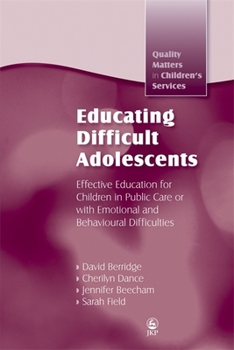Educating Difficult Adolescents: Effective Education for Children in Public Care or with Emotional and Behavioural Difficulties
Educational achievements for children in care are significantly poorer than for the general school population. This book explores why this is and how to enable children in care to succeed in the classroom.
It evaluates the educational experience and performance of a sample of 'difficult' adolescents living in foster families, residential children's homes and residential special schools for pupils with behavioural, emotional and social difficulties (BESD). The book addresses factors such as the failure to prioritise education for children in care, placement instability and disrupted schooling. It investigates care environments, policy changes and young people's background experiences - as well as the costs of services - in order to gauge the effectiveness of targeted initiatives. The authors adopt a multidisciplinary approach to suggest how best to support children in care in educational settings. This book will be essential reading for professionals supporting children in care, including social workers, directors of children's services, policy makers, school leaders, teachers and managers in the public, voluntary and private sectors. It is also highly relevant for social work and education lecturers, researchers and students.Format:Paperback
Language:English
ISBN:1843106817
ISBN13:9781843106814
Release Date:September 2008
Publisher:Jessica Kingsley Publishers
Length:224 Pages
Weight:0.75 lbs.
Dimensions:0.6" x 6.1" x 9.0"
Customer Reviews
0 rating





